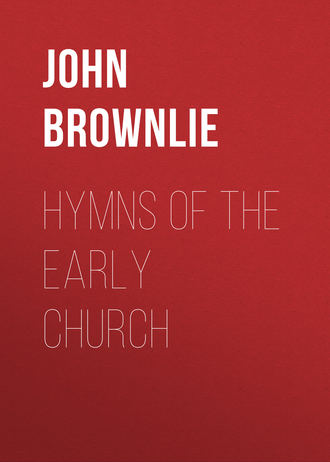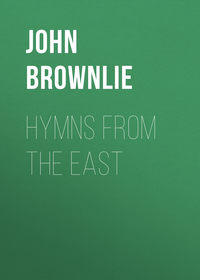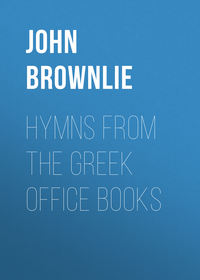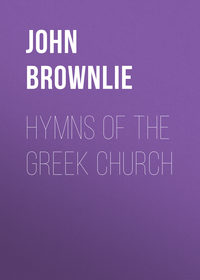 полная версия
полная версияHymns of the Early Church
LUCIS CREATOR OPTIME
By Gregory, surnamed the Great, born at Rome about 540; succeeded Pelagius in the Papal Chair, 590; sent Augustine on a mission to Britain in 596; died in 614. He ranks among the Four Latin Doctors, and because of the services he rendered to the ritual of the Church, he was styled Magister Cæremoniarum. The Gregorian tones or chants are the fruit of his study of sacred music.
IThou, blest Creator of the light,From whom the day its splendour brings,Thy word the earth to beauty woke,When light came forth on glowing wings.IIThe circle of the day is Thine,The morn, and night in one are bound; —O hear our earnest prayer as nowThe gloomy shades are gathering round;IIIO free our souls from guilty stains,That we Thy favour still may know;And let no thought the mind possess,To bind the heart to earth below.IVThat we may beat at heaven’s fair gate,Where safely stored our treasure lies,Purge us from every filthy stain,Teach us all evil to despise.VHear us, O Holy Father, hear,And Thou the Everlasting Son,Who with the Holy Spirit reign’stWhile the eternal ages run.MONDAY MORNING
AURORA JAM SPARGIT POLUM
Placed by Duffield in a class which contains hymns formerly called Ambrosian, but now known to be the work of other hands. George Cassander, the liberal Catholic collector (1556), writes “Incognitus auctor” after the hymn, which has a place in several old Hymnaria, such as the Durham, the Cottonian, and the Harleian.
INow daylight floods the morning sky,And earthward glides the approaching day,The dancing rays of sunlight chaseThe gathered fears of night away.IIHence dreams that cloud the soul! away,Ye terrors grim of midnight born!Whate’er the dark of night hath bred,Die in the light that greets the morn!IIISo when the day eternal breaks, —That day for which our spirits long, —Its light may fall to bless our souls,E’en while we raise our morning song.IVTo God the Father throned in heaven,To Christ the one begotten Son,And to the Holy Ghost be praise,Now, and while endless ages run.MONDAY EVENING
JESU, DULCIS MEMORIA
Generally, and there seems little reason to doubt correctly, ascribed to Bernard of Clairvaux. Born in 1091 at his father’s castle near Dijon in Burgundy; died, 1153. The monk of Citeaux, the first Abbot of Clairvaux, the Papal controversialist and the preacher of the Second Crusade, is better known in our day as the author of a hymn regarded by many as the sweetest and most Evangelical in mediæval hymnody. The poem from which the hymn is taken consists of nearly fifty quatrains on the name of Jesus, known as the Joyful Rhythm of St. Bernard. In the Roman Breviary three hymns are taken from the Rhythm, Jesu dulcis memoria, Jesu Rex Admirabilis, and Jesu decus angelicum.
IO Jesus, when I think of Thee,True gladness fills my heart;But joy unspeakable ’twill beTo see Thee as Thou art.IIO blessed name! No note more sweet,No music so divine;Its charms the dearest fancies greetThat with my memory twine.IIITo those who come with sin confessed,Thy name their hope inspires;And every needy soul is blessed,And granted all desires.IVTo those who seek, ah! Thou art foundFar more than all desire —A living fount whose streams abound,A flame of heavenly fire.VWhat tongue can e’er the charm express?What words its beauty show?For Thy dear name’s sweet lovelinessNo heart can ever know.VIWho only taste the heavenly bread,They hunger for the feast;Who drink of Christ, the Fountainhead,But find their thirst increase.VIIO Jesus, to my fainting heartWhen wilt Thou come to speak?O, when to me Thy bliss impart,And more than I can seek?VIIIO I will feed and hunger still,O I will drink and pineTill Thou my famished spirit fillWith that blest name of Thine.TUESDAY MORNING
O DEUS, EGO AMO TE, NAM PRIOR TU AMASTI ME
Credited by many to the composer of the hymn which opens with identically the same line, but proceeds quite differently. It is, however, doubtful if this is the composition of Xavier; more probably it is the breathing of desire on the part of some now unknown German Jesuit of the seventeenth century.
IMy heart goes forth in love to Thee,O God, who first hast lovèd me;My freedom, lo, I lay aside,Thy willing slave whate’er betide.IIMay memory ne’er a thought suggest,That comes not forth at Thy behest;And may the mind no wisdom know,That God all wise doth not bestow.IIIMay nothing be desired by me,Save what I know is willed by Thee;And what of Thine I e’er attain,I render back to Thee again.IVTake what Thou gavest – all is Thine;Dispose as suits Thy will divine;Rule, Lover of my soul; I restIn Thy blest will who knowest best.VThat I may love Thee as I will,O let Thy love my bosom fill;This gift alone endureth aye —All else are dreams that flit away.TUESDAY EVENING
TE LUCIS ANTE TERMINUM
Sometimes ascribed to St. Ambrose. It is found in eleventh-century Hymnaria of the English Church, and in the Breviaries of Rome, Paris, Sarum, York, and Aberdeen, generally as a hymn at Compline.
IMaker of the world, we pray,Ere the dark of night surround us,Let Thy love beside us stay,Throw protecting arms around us.IIPhantoms of the night away!Let no evil dream affect us;Pure as falls the light of day,From the taint of sin protect us.IIIHear us, Father, when we cry;Hear us, Christ, Thy grace extending;Hear us, Spirit, throned on high,Three in one, through years unending.WEDNESDAY MORNING
JAM META NOCTIS TRANSIIT
This morning hymn is one of four attributed to St. Hilary. Born at Poitiers early in the fourth century; became bishop of his native town about 350; died 13th January 368. His saint’s day (which gives name to Hilary Term in English law courts) is celebrated on 14th January, in order not to trench upon the octave of the Epiphany.
IGone are the shades of night,The hours of rest are o’er;New beauties sparkle bright,And heaven is light once more.IITo Thee our prayers shall speed,O Lord of light divine;Come to our utmost need,And in our darkness shine.IIISpirit of love and light,May we Thine image know,And in Thy glory bright,To full perfection grow.IVHear us, O Father blest,Hear us, O Christ the Son,And Comforter the best,Now, and till life is done.WEDNESDAY EVENING
LABENTE JAM SOLIS ROTÂ
By Charles Coffin. (See p. 3.) Chandler’s translation, beginning, “And now the sun’s declining rays,” is for “Ninth Hour, or three in the afternoon,” of Sunday. In “Hymns Ancient and Modern” Chandler’s rendering is given as an evening hymn, and with considerable alterations, the first line being, “As now the sun’s declining rays” (No. 12).
INow sinks the glowing orb of day,And silent night comes on apace;So gains our life the appointed goal,That marks the limit of our race.IIO Christ, uplifted on the Cross!Thine arms were stretched towards the sky;Grant us with love that Cross to seek,And folded in those arms to die.IIINow to the Father throned on high,And unto Christ His only Son,And to the Spirit, glory be,Now, and while endless ages run.THURSDAY MORNING
SPLENDOR PATERNÆ GLORIÆ
This morning hymn is the complement of Æterne rerum Conditor, and, like it, almost indisputably by St. Ambrose. Its use was generally for Matins or Lauds on Monday; by some monastic orders it was used daily.
IFrom the Father’s throne descending,Light from out the realms of light;Font of light, all light transcending,Brighter day in day most bright.IIShine, True Light, in radiant brightness,Flashing forth perpetual ray;May Thy Spirit’s searching lightness,Fill our souls with endless day.IIIFather, come we humbly bending, —Father of Almighty grace,Who hast glory never ending,Banish every sinful trace.IVWhen to do Thy will inclining,Quell for us the tempter’s wrath;Ne’er in trial’s hour repining,Lead us in the upward path.VMay Thy rule our minds enlighten;Let no sin our lives defile;Fervent faith our spirits brighten,Knowing nought of fraud or guile.VIChrist, the Bread of Life bestowing,Faith our daily cup shall fill;Draughts of joy for ever flowing,Drink we from the Spirit’s rill.VIIThus our life in beauty gliding —Purity like dawn of day,Faith like sun at noon abiding,Eve that knows no twilight grey.VIIIForth in beauty rides the Morning —Be Thy glory on us poured;Son, the Father’s love adorning,Father in th’ Eternal Word.THURSDAY EVENING
SALVATOR MUNDI, DOMINE
Author unknown. Found in the Hymnaria of Sarum, and York, also in the Sarum, York, Hereford, and Aberdeen Breviaries. Used at Eton in Latin original at evening service until about 1830.
IThou who hast led our steps this day,Blest Saviour of the world, we pray,Through all the night Thy care extend,And save us to our journey’s end.IIBe present with us, Lord, who wait,And lift our cry at mercy’s gate;Take all our load of sin away,And change our darkness into day.IIIFree Thou our minds from careless sleep,Our souls from sin’s allurements keep;And may our flesh from every stain,All pure, we pray Thee, still remain.IVTo Thee of purity the spring,Our prayers ascend on soaring wing;Hear Thou our cry, and with the mornMay purity our souls adorn.VGlory be unto God always,To Christ the Son eternal praise;Glory to God the Spirit be,From age to age eternally.FRIDAY MORNING
CHRISTE, LUMEN PERPETUUM
By Magnus Felix Ennodius, born at Arles about 473; became Bishop of Pavia about 514; died, 521; buried on 17th July of that year, which day is observed as his festival by the Roman Church.
IChrist, the light that shines eternal, —Light that gilds the rolling spheres,Dawn upon our night, and keep usPure as light when day appears.IILet no gin of Satan snare us,Let no enemy oppress;Wakeful aye with garments spotless,May we walk life’s wilderness.IIIKeep our hearts in Thy safe keeping,Be Thy flock Thy special care;In Thy fold in mercy tend them,Guard their footsteps everywhere.IVAnd our souls shall sing triumphantWhen Thy light our eyes shall see,And the vows we owe are rendered,God, the great Triune, to Thee.FRIDAY EVENING
NOX ATRA RERUM CONTEGIT
This hymn is classed by Duffield under the heading “Ambrosian,” which includes compositions of Gregory and other authors. Mone gives it as probably by St. Gregory.
IDark night has drawn her curtain round,And hid earth’s hues in gloom profound;Now contrite at Thy feet we fall,And make request, Thou Judge of all,IIThat Thou wouldst hide the guilt of sin,And throughly purge our hearts within —O Christ, dispense Thy grace, we pray,To keep us guiltless day by day.IIIThe awakened conscience, sore oppressedBy thought of sin all unconfessed,Yearns in the gloom, to cast her loadAt Thy blest feet, Redeemer, God.IVDispel the darkness, Lord, we pray,That in our mind holds dismal sway;Send forth Thy light, and bid us restIn Thy calm peace, for ever blest.SATURDAY MORNING
JAM LUCIS ORTO SIDERE
Frequently ascribed to Ambrose, but not by his Benedictine editors. A rendering of it by Dr. Neale is one of the morning hymns in “Hymns Ancient and Modern,” “Now that the daylight fills the sky” (No. 4); but the rendering has been considerably altered by the editors.
ISee in the east the morn arise;Seek, wingèd prayer, the glowing skies;Bring help from Heaven, that all our wayBe pleasing to our God this day.IIMay He restrain from words of sin;For bitter strife give calm within;Veil from our eyes the garish light,That lures the soul to darkest night.IIIPure may our inmost heart remainFrom evil thoughts and fancies vain;And may the curb our flesh control,That drags to earth the aspiring soul.IVSo, when the last stray beams of lightShall fade before the return of night,Kept in the path our feet have trod,We shall give glory to our God.VTo God the Father, throned in heaven,To Christ, the one begotten Son,And to the Holy Ghost be praise,Now, and while endless ages run.SATURDAY EVENING
JAM SOL RECEDIT IGNEUS
A recast of O Lux beata Trinitas, one of twelve hymns the Benedictine editors regard as undoubtedly the work of St. Ambrose, and which, in the older Breviaries, was used at Vespers on Saturday.
INow sinks the fiery orb of day —O One in Three, Eternal Light,O Three in One, for ever bright,Shine in our darkened minds, we pray.IIWhen morning breaks, our songs we raise;When evening falls, we still adore;When morn and eve shall come no more,In mercy grant us still to praise.IIIAll praises to the Father be,All praise to the Eternal Son,And to the Spirit, Three in One,From age to age eternally.Advent
CHRISTE, PRECAMUR ANNUE
By Ennodius, Bishop of Pavia. (See p. 32.)
ITo Thee, O Christ, our prayers shall rise,With tears of sorrow blending;Come for our help Thou Holy One,On our dark night descending.IIOur hearts shall find their rest in Thee,And e’en in dreams shall praise Thee;And with each rising of the sun,Anew their songs shall raise Thee.IIIImpart a noble life, and mayOur spirit’s warmth be heightened.Bid night depart, and with Thy love,O may our lives be brightened.IVIn hymns we pay our vows to Thee:At vesper-hour we pray,Erase the writing we have made,Thine own let stand for aye.IN NOCTIS UMBRA DESIDES
By Charles Coffin. (See p. 3.)
IWhen evening shades around us close,And bound in sleep our limbs repose,The watchful soul, from slumber free,Shall breathe its earnest prayer to Thee.IIDesire of Nations, Word of God,Thou Saviour of the World abroad,Hear Thou our mournful prayer at length,And raise the fallen by Thy strength.IIIBe near, Redeemer; by Thy graceForgive our erring sinful race,Bound in the prison-house of sin —O, open heaven and lead us in.IVO Thou who cam’st to set us free,To Thee, the Son, all praises be;To Father, Spirit, Three in One,While the eternal ages run.VENI, VENI, EMMANUEL!
An antiphon. The term denotes a short versicle said at the beginning and close of a psalm or psalms in the Breviary Offices. This antiphon is by an unknown author. Dr. Neale, who supposes it to be of twelfth-century date, published a translation of it in 1851, beginning, “Draw nigh, draw nigh, Emmanuel,” an altered version of which occurs in “Hymns Ancient and Modern” as an Advent hymn, with first line altered to, “O come, O come, Emmanuel” (No. 36).
IEmmanuel, come! we call for Thee;Come, set Thy captive Israel free,Who, sore at heart, in exile waitTheir absent Lord, who tarries late.Joy, joy, Emmanuel shall be bornFor thee, O Israel, forlorn.IICome, Root of Jesse! for our foesIn cruel snare our souls enclose;Bring us, we pray, from hell’s dark cave,From gulf profound Thy people save.Joy, joy, &c.IIICome, come, O Harbinger of day!Cheer Thou our hearts with heavenly ray,Dispel the clouds of night that roll,The dark of death that fills the soul.Joy, joy, &c.IVCome, Key of David! in Thy mightUnlock for us the realms of light;Make safe the path that upward tends,Close Thou the way that downward wends.Joy, joy, &c.VCome, come, O Thou Almighty Lord!From Sinai once went forth Thy word,When in the midst of eddying flame,Thou didst Thy law in might proclaim.Joy, joy, &c.Christmas
NATO NOBIS SALVATORE
By Adam of St. Victor. A native of either Britain or Brittany, probably the latter; educated at Paris; became, about 1130, a monk in the Abbey of St. Victor, then in the suburbs, afterwards absorbed in the city of Paris; there he passed the remainder of his life, and died somewhere between the years 1172 and 1192. In liturgical services the Gradual or Antiphon, sung between the Epistle and Gospel, ended on festival days with the word Alleluia. The final syllable of this vocable was prolonged in a number of musical notes called sequentia, and by the ninth century it became common to adapt words to these notes, which words are now called “sequences.” Adam of St. Victor was one of the most voluminous composers of this kind of sacred Latin verse.
ILet us tune our hearts and voices —All creation wide rejoices,For a Saviour has been born;Given to man, his weakness wearing,Dwelling with the sad despairing,Light and health our life adorn.IIFrom the midst of Eden’s gladnessCame the dower of death and sadness,But the Saviour’s life is ours.Banished now are death and sorrow;Life and joy from Christ we borrow,More dwelt in Eden’s bowers.IIIFrom the height of heaven above us,God looked down on earth to love us,And He sent His only Son.Now no more His face concealing,Bridegroom like, His grace revealing,Came He forth His work begun.IVSwift and strong, a giant glorious,O’er our death He came victorious,Girt with power His course to run.Came he forth salvation willing,Law and prophecy fulfilling,Till the task assayed is done.VJesus, who hast brought salvation,Healing balm for every nation,Thou our glory art and peace.Praise Thy glorious deeds shall mention,Who in humble condescension,Cam’st Thy servants to release.PUER NATUS IN BETHLEHEM
The oldest form of this Christmas carol is found in a Benedictine Processional belonging to the beginning of the fourteenth century.
IZion is glad this glorious morn:A babe in Bethlehem is born.IISee where He lies in manger low,Whose kingly reign no end shall know.IIIThe ox and ass that filled the stall,Knew that the babe was Lord of all.IVOut from the east the sages bringTheir treasures for an offering.VThey humbly seek the lowly place,And worship there the King of grace:VIThe Son of God, who made the earth,A virgin mother gave Him birth.VIINo poison from the serpent stainsThe human blood that fills His veins;VIIIAnd though our flesh He meekly wears,No mark of sin His nature bears;IXThat He might man to God restore,And give the grace that once He wore.XCome while our hearts are full of mirthAnd bless the Lord of lowly birth.XIThe Holy Trinity we’ll praise,And give our thanks to God always.HEU! QUID JACES STABULO, OMNIUM CREATOR?
By Jean Momboir, with Johannes Mauburnus for the Latin, and John Mauburn for the English form of his name. Born in 1460 at Brussels; a Canon Regular of the Brethren of the Common Life in the Low Countries; died Abbot of the Cloister of Livry, not far from Paris, in 1502 or 1503. In his large work, the “Spiritual Rose-garden,” there is a rosary on the birth of Christ, consisting of thirteen stanzas, which commence, Eja, mea anima, Bethlehem eamus. The hymn beginning as above consists of three stanzas taken from that poem. The detached stanzas passed into many of the older German hymn-books, met with great favour in the early Reformed Churches, so long as the practice of singing Latin compositions survived among them, and still retain a place in some German hymnals in an old translation, with for opening line, Warum liegt im Krippelein.
I(Loquitur peccator)Wherefore in the lowly stall,O Thou great Creator,Dost Thou raise Thine infant call,Glorious Renovator?Where Thy purple if a King?Where the shouts Thy subjects bring?Where Thy royal castle?Here is want with all her train,Poverty proclaims her reign —These Thy court and vassal.II(Jesus respondit)Hither, by My love impelled,Have I come to save thee;Sin has long thy nature held,Powerful to enslave thee.By My emptiness and woe,By the grace that I bestow,Do I seek to fill thee.By My humble, lowly birth,By this sacrifice on earth,Blessing great I will thee.III(Laudant fideles)Songs of praise, ten thousand songs,Sing I will and laud Thee;For such grace my spirit longs,Ever to applaud Thee.Glory, glory let there be,Lover of mankind to Thee,In the heaven supernal.Let this testimony flyOver earth, and sea, and sky,Borne by songs eternal.QUICUMQUE CHRISTUM QUÆRITIS
This hymn for the Epiphany forms part of a larger one of very complex authorship, known as A solis ortûs cardine, Et usque terræ limitem. This portion of that Christmas hymn has by some been assigned to St. Ambrose, but by a majority of judges to Prudentius, “the Horace and Virgil of the Christians,” in the estimate of the scholarly Bentley. Aurelius Prudentius, Clemens, or the Merciful, was born in 348, somewhere in the north of Spain. After filling various secular offices he retired, in his fifty-seventh year, into private life, and devoted himself to the composition of sacred verse. He died circa 413, but where we are not told.
IO ye who seek the Lord, come nigh,To heaven uplift your reverent eyes,The Royal Banner of our GodIs blazoned on the midnight skies.IIBrighter than when the sun at noonPours forth its radiance on the earth,See yonder star its glory sheds,And tells to man the Saviour’s birth.IIIO wisdom seeks the lowly stall,And takes the guidance of the star,To worship where the Incarnate lies,And offer gifts from lands afar:IVWith incense, worships the Divine,With gold, a kingly tribute pays,And at the feet of God made Man,The myrrh in sweet profusion lays.VO Bethlehem, city ever blest!What honour more could come to thee?The cradle of the Incarnate God,Who came to set His Israel free!VIO Jesus, to the world revealed!To Thee let glory ever be,To Father and to Holy Ghost,From age to age eternally.Epiphany
JESU, NOSTRA REDEMPTIO
Probably of the seventh or eighth century. Found in three MSS. of the eleventh century in the British Museum Library; also in the old Roman, Sarum, York, and Aberdeen Breviaries. Chandler’s rendering of this fine hymn – “O Christ, our hope, our heart’s desire,” and which is to be found in most collections, is the hymn for Evensong on Ascension Day in that author’s “Hymns of the Primitive Church.”
IThou our Redeemer art, O Christ,Our heart’s desire, our fervent love;Creator of the worlds, Thou cam’stTo wear our flesh, from heaven above.II’Twas love that brought Thee to our aid,To bear the burden of our woe,To bow the head in shameful death,And life, immortal life, bestow.IIIAsunder burst the bands of hell,The captives hailed the glorious day;And by Thy mighty triumph crowned,Thou art at God’s right hand for aye.IVO may Thy mercy still abound,That, by the goodness of Thy grace,We daily o’er our sin may rise,And see the beauty of Thy face.VSpring of our joy, be Thou, O Christ;Our great reward, hereafter be;And while the endless ages run,Our praises shall be all of Thee.EI CANAMUS GLORIAM
By C. Coffin. (See p. 3.)
INow let us tune our hearts to singThe glory of the Almighty King;His hand unrolled the spacious skies,Whose beauty lures our wondering eyes.IIThere are the clouds with treasure rare,Slow floating in the higher air,Whence come the soft refreshing showers,To bless the springing of the flowers.IIIRich is the treasure of Thy grace,Prepared for us who seek Thy face;It falls from clouds that earthward roll,And penetrates the inmost soul.IVAnd faithful hearts that thirsting pine,Drink deeply of the draught divine,And with an heavenly impulse rise,To greet the sunlight in the skies.VO happy souls that evermoreDrink of the bliss Thou hast in store;May grateful love responsive flowTo all the love Thou dost bestow.VINow, glory to the Three in One,To God the Father, God the Son,And to the Spirit, one in Three,From age to age eternally.DEUS-HOMO, REX CŒLORUM
By Bishop Marbodus. Born in Anjou, 1035; successively Archdeacon of Angers and Bishop of Rennes; died in 1125. Was author of a poem De Gemmis, which gives a mystical explanation of precious stones much in favour in the Middle Ages.
IKing of heaven, our nature wearing,Pity lend the sad despairing;’Neath the sway of sin repining,Formed from dust, to dust declining —Tottering in our ruined state,Strengthen by Thy goodness great.IIWhat is man from sin descending?Child of death, all woes attending.What is man? a worm that clingethTo the earth from which he springeth.Wilt Thou forth Thine anger bring,On a weak, defenceless thing?IIIShall not man, who earthward tendeth,Look to God, who mercy sendeth?’Twere a task most unbefitting,God o’er man in judgment sitting —Yet should God in judgment speak,Where shall man an answer seek?IVAs the shadow quickly flying,Faint our life and sure our dying;As the cloud by tempest driven,As the grass cut down at even; —King of heaven, in mercy great,Pity the disconsolate.



